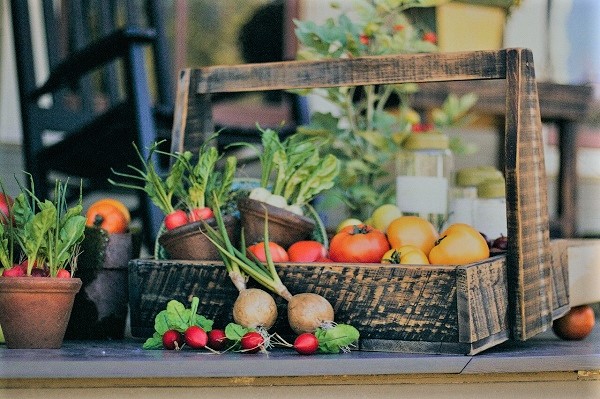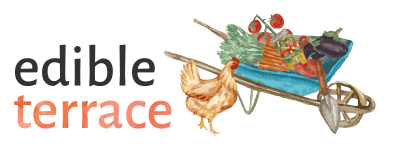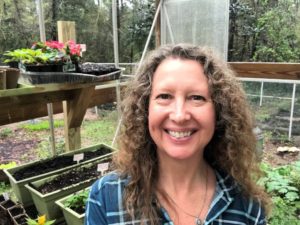Hey! By the way… TheEdibleTerrace is reader-supported. When you buy through links on our site, we may earn an affiliate commission and as an Amazon affiliate, we earn from qualifying purchases. Thanks in advance for your support!

Are you agonizing over finding the best fertilizer for vegetable gardens? I am guessing you have already planned out the garden in your backyard, patio, or balcony. You’ve got your seeds and you’ve plotted out your space.
But do you know what kind of fertilizer you’re going to feed your plants? Do you know which is the best fertilizer for vegetable gardens? There are many brands out there.
If you are looking to fertilize your garden with natural materials, composting is the best organic fertilizer for vegetables, but not everyone has the time, and it would take about a year to yield useable compost. This would mean your gardening plans would be derailed for about a year, unless you find a viable substitute in the meantime.
Plant food is nice, but, if you are looking to grow an organic garden, be wary of ingredients in the plant food you can’t pronounce, as these ingredients can be pesticides that have been snuck in to kill insects, even the ones that help pollinate your plants. If you aren’t sure about what’s in the food, you can always look up the definitions in a search engine such as Google and do your research there.
Best Fertilizers For Vegetables
Dr. Earth 733 Organic 5 Fertilizer, Tomato Vegetable Herb
[easyazon_infoblock align=”none” identifier=”B0047BIWDU” locale=”US” tag=”edibleterrace-20″]
Dr. Earth’s Organic Vegetable and Herb Fertilizer is completely natural thus making it pet and people safe. It contains Alaskan fish bone meal, Norwegian cold water kelp meal, alfalfa meal, naturally mined potassium sulfate and a concentrated seaweed extract.
It also contains probiotics and ecto and endo mycorrhizae which help with nutrient enhancement and drought tolerance. If used as directed, chemical fertilizers are not needed when using this product. This just might be the best fertilizer for vegetables.
Bokashi Brothers Bokashi Compost
[easyazon_infoblock align=”none” identifier=”B01EYVQZJ0″ locale=”US” tag=”edibleterrace-20″]
What is Bokashi? It is Japanese for “fermented compost”. Compost is decomposed plant material, which is an excellent way to feed your plants. When you ferment compost, you boost its potential to feed root systems and protect your plants from fungi and diseases. This is vital for getting the most out of your garden.
Most fertilizers just feed the root system to help grow big and delicious fruits and vegetables, but they lack the nutrients you can find in composted materials. This one gives you the best all around vegetable fertilizer for your garden in terms of both food and plant protection.
Bloom And Root Soluble Dry Plant Food
[easyazon_infoblock align=”none” identifier=”B00D8NPPJC” locale=”US” tag=”edibleterrace-20″]
If you’re looking for low maintenance feeding for your plants due to a hectic schedule and no time to work fertilizer into the soil you’re using, this water soluble plant food will be the best fertilizer for your vegetable garden. Just mix one teaspoon to a gallon of water and use it once a week to ensure that your plants get all the nutrients they need to grow.
Don’t let the name fool you. Many people have given it high reviews in fruit and vegetable gardens as well as flower gardens. It’s easy to mix and easy to use.
Diatomaceous Earth
[easyazon_infoblock align=”none” identifier=”B00025H2PY” locale=”US” tag=”edibleterrace-20″]
Diatomaceous Earth is microscopic silica (sand, basically) and algae. This versatile substance can feed plants, kill parasites and unwanted insects, like fleas and ticks, and also provide a wonderful nutrition boost for your daily routine as well. All you have to do is sprinkle it on your plant’s soil around the root stem and that’s it. It will feed your plant while deterring all the organisms that can destroy it.
It can also boost the plant’s immune system. You can also use it in your food as well, giving it even more uses than just in your garden. Don’t believe me? Just read the reviews!
Calcium Sulfate Dihydrate – Gypsum
[easyazon_infoblock align=”none” identifier=”B008LETYN6″ locale=”US” tag=”edibleterrace-20″]
If your soil’s Ph is off , this will be the best fertilizer for a home garden. It will help balance the Ph, leading to better yielding fruits and vegetables. Depending on the soil in your yard, you may need some fertilizers to help condition the soil, especially if you’re in the south where you have more clay than actual soil.
Mixing this in with compost or other fertilizer makes the best one-two punch, and gives your garden a running start in growing the root systems that are vital to plant health. Gypsum is a combination of calcium and sulfur, two elements that can lower the Ph of acidic soil.
 Conclusion
Conclusion
Plants should be fertilized twice a month with dry fertilizer. If you are using water soluble plant food, once a week is what you will need to do to make sure your plants are properly fertilized and have the best chance to grow strong.
You can help out the fertilizer by adding crushed egg shells to your soil and also mixing in coffee and tea grinds. One tablespoon of each is just right for large plants. Use half a tablespoon for smaller plants. Finding the best fertilizer for vegetable gardens is a necessity for a successful harvest. I hope this post has put you on the right track to helping you grow your own edible garden.

